2023 Maureen Keller Student Awards
Serena Sung-Clarke (Best Oral Presentation)
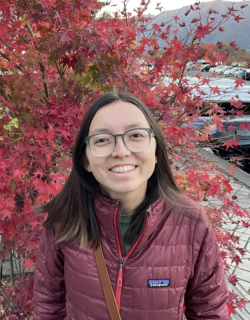
Serena is a Ph.D. candidate with the Massachusetts Institute of Technology/Woods Hole Oceanographic Institution (MIT/WHOI) Joint Program in Applied Ocean Sciences. She is advised by WHOI’s Dr. Michael Brosnahan. She studies the ecology of the dinoflagellate Dinophysis using a mix of field observations, culture experiments, and molecular methods. Her presentation at ICHA2023 described her work investigating subsurface accumulation and phased sexual reproduction in a Dinophysis bloom population in the absence of their obligate prey.
Serena earned her Bachelor of Arts with high honors from Swarthmore College in 2019, with majors in Biology and Political Science. As an undergraduate, she worked in Dr. Elizabeth Vallen’s lab, studying cnidarian immune protein interactions. Her interest in HABs started during the summer of 2018, when she had the opportunity to work with Dr. Jacques Oliver and Dr. Lester Yuan at the U.S. Environmental Protection Agency (USEPA) analyzing freshwater and estuarine nutrient impairment and HAB occurrence. Before starting her Ph.D., Serena spent two years working for Cadmus on USEPA contracts, developing watershed health assessments, leading regulatory workshops for water utilities, and compiling research on chemical contamination. Now, as a student in the Brosnahan Lab, she pries into the mysterious lives of Dinophysis dinoflagellates and hopes to shed light on their response to starvation and life history processes.
Kristof Möller (Best Oral Presentation)
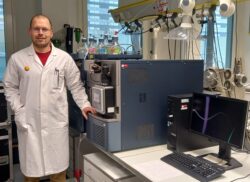
Kristof Möller, from the Alfred-Wegener-Institute Helmholtz Centre for Polar and Marine Research (Bremerhaven, Germany), received the Maureen Keller Award for his presentation about: “Ichthyotoxicity of the harmful dinoflagellate Alexandrium pseudogonyaulax and predator-prey interactions with the copepod Acartia tonsa” co-authored by Urban Tillmann, Magdalena Pöchhacker, Bernd Krock, Elisabeth Varga, Florian Koch, Thomas Harris and Cédric L. Meunier.
Kristof Möller is a Ph.D. student in the Ecological Chemistry section at the Alfred-Wegener-Institute. His doctoral thesis focuses on the toxic dinoflagellate Alexandrium pseudogonyaulax in Northern European waters, particularly considering its recent increase in abundance. His research involves investigating bottom-up and top-down population controls of A. pseudogonyaulax, as well as assessing its toxicological effects on other trophic levels including zooplankton and fish. Additionally, he analyses how A. pseudogonyaulax has been introduced and what factors have contributed to its proliferation by conducting a time series analysis of long-term monitoring programs in Sweden, Norway, Denmark, and Germany. Kristof earned his Master of Science degree in biochemistry and Bachelor of Science degree in chemistry and biochemistry from the Ludwig-Maximilians-University in Munich. His master's thesis, which focused on establishing a method for extracting and quantifying vitamin B12 from seawater, sparked his interest in marine sciences. His research interests now encompass biotoxins, harmful algae blooms, and marine carbon dioxide removal techniques.
Loïc Plessis (Best Poster Presentation)
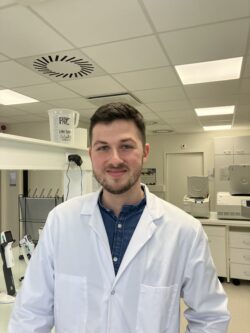
Loïc Plessis, PhD student from the French Research Institute for Exploitation of the Sea (Ifremer) and Nantes University, was awarded the Maureen Keller Student Award for the best poster presentation titled “Portimine from Vulcanodinium rugosum induces severe pyroptosis in primary skin cells through ribotoxic stress response (RSR)” co-authored by Léana Gorse, Korian Lhaute, Fabienne Hervé, Damien Réveillon, Stéphanie Brédif, Patrice Brehmer, Étienne Meunier, and Philipp Hess.
Loïc’s scientific journey began with a two-year diploma in applied chemistry at the Institute of Technology of Orléans University, followed by an internship in organic chemistry synthesis at Rothamsted Research, United Kingdom. He then pursued a double course in chemistry and biotechnology at two engineering schools at Strasbourg University, in European School of Chemistry, Polymers and Materials Science (ECPM) and European School of Biotechnology (ESBS). To complete his engineering diploma, he interned at the phycotoxin laboratory of Ifremer Nantes, working for the first time on toxic microalgae. Specifically, Loïc studied the chemical diversity of two toxic microalgae belonging to the genus Azadinium.
Currently, Loïc is conducting his PhD research under the supervision of Dr. Philipp Hess between two laboratories: the METALG laboratory at Ifremer Nantes, Phytox unit, and the Groupe Rocher skin lab in Paris. His research focuses on investigating the impact of various microalgae and their metabolites on skin cells, with an emphasis on inflammatory effects. This includes studying both toxic microalgae for Ifremer, such as Ostreopsis and Vulcanodinium, and microalgae of cosmetic interest for Groupe Rocher. During his PhD, Loïc had the opportunity to collaborate with the Institute of Pharmacology and Structural Biology (IPBS) of Toulouse, which helped clarifying the mechanism of action of the emerging toxin Portimine from V. rugosum.
Lucia Beatrice Cal (Best Poster Presentation)
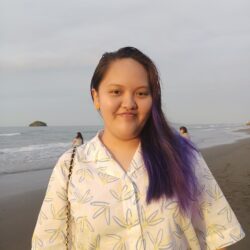
Lucia Beatrice Cal received the Maureen Keller Student Award for her poster entitled: “Morphological and phylogenetic characterization of toxic Coolia malayensis from the West Philippine Sea”, co-authored by Robert Jay Ramos, Juri Nazareth Ochotorena, Gian Carlo Gaetos, and Dr. Deo Florence Onda.
Lucia is a MS Marine Science student affiliated with the Microbial Oceanography Laboratory of the Marine Science Institute, University of the Philippines. She earned her Bachelor of Science degree, majoring in Biology, from the same university and took an interest in microalgae while taking a phycology elective as an undergrad.
She works as a research associate while pursuing her Master’s degree under the “Real-time Monitoring and Early Warning for HABs Using High Throughput Imaging and Molecular Methods (the HABs Watch Project)” led by her adviser Dr. Onda, which aims to use a combination of machine-learning and the Imaging Flow Cytobot/IFCB (McLane Laboratories) to develop a real-time detection system for harmful phytoplankton. She is tasked with establishing and maintaining diatom and dinoflagellate monocultures, but is also being trained in using the IFCB. Her research is currently focused on benthic dinoflagellates, whose distribution patterns are not well-studied in the Philippines, and marine microbial ecology.

